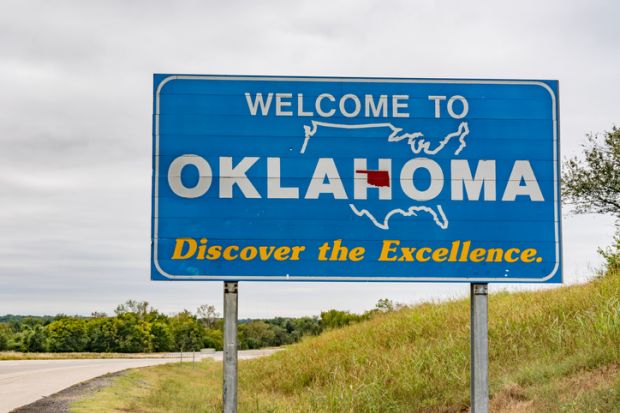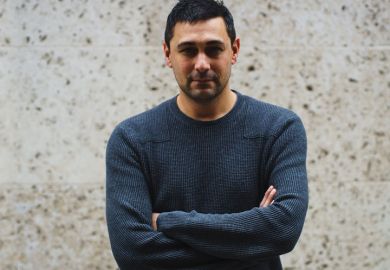It happened again − this time at the University of Oklahoma. Two more professors used the N-word during class, angering students who say it was pedagogically unnecessary and hurtful.
But what started as a protest over those incidents has escalated into a student sit-in at Oklahoma’s central administration building and calls for provost Kyle Harper to resign. The university says it won't happen.
“Our demands still have not been met, so we will continue to do a sit-in, we will continue to do a hunger strike,” organisers of the campus group Black Emergency Response Team, or BERT, said in a statement from their position in Evans Hall. That was after the university’s interim president, Joseph Harroz, met with protesters late Wednesday and after Oklahoma released a statement saying that both parties “identified areas of agreement that will move our university forward”.
The administration’s letter was signed by two vice-presidents and by Professor Harroz, who released a similar statement on his own earlier in the week promising mandatory diversity, equity and inclusion training for all faculty and staff members and a new incident response protocol. Students had been seeking that first change, among others, including the creation of a new multicultural centre on campus.
Professor Harper, the locus of students’ disaffection, didn’t sign either letter. He did not respond to a request for comment.
Professor Harroz said in another statement that he “cannot engage the demand for the immediate resignation of the provost”. While he listened to BERT’s “concerns and will always listen to concerns from our students”, he said, “I am confident in Provost Harper’s abilities and willingness to work constructively to advance the university.” What many do not know, Professor Harroz continued, is that nearly a year ago, “Harper requested to return to the faculty”, to his professorship in Classics and letters.
“I personally asked him to continue to serve through an important period of transition and to help us complete and launch the strategic plan,” Professor Harroz said of Professor Harper, who is a graduate of Oklahoma. “He put his personal pursuits on hold to serve his alma mater. There is no doubt that he loves our university and serves it tirelessly.”
BERT organisers said they’d met with administrators again and planned to issue new demands for “checks and balances” within the offices of the president and provost.
A separate memo Professor Harroz’s office released late Thursday promised to present the following to Oklahoma’s Board of Regents for consideration next month: the mandatory equity training for all faculty and staff members, to start in the autumn; a semester-length equity and inclusion general education course to “promote respect for all” students; expanded student mental health resources; and an exploratory committee for the requested multicultural centre.
Students fault Professor Harper for what they call his long record of “silence” on matters of diversity and inclusion.
Campaigning for Professor Harper’s resignation on social media under the hashtag #HarperHasToGo, campus groups − including BERT, the Black Student Association and OU UnHeard − say that Professor Harper was silent in 2015 when students told Oklahoma to do more to hire and retain black professors and staff members. They say Professor Harper was silent when students made similar demands following a 2019 incident in which a student wore blackface and used a racial slur. And he has been silent over the past two weeks with respect to two professors using racial slurs in the classroom, they say.
In each of these instances, the university addressed students’ concerns with various comments and actions. But the protesters describe Professor Harper’s individual, at least publicly muted, reaction to these matters as disqualifying for a chief academic officer.
That Professor Harper has been “silent” on the recent N-word controversies isn’t quite accurate − at least not as of this week. In a statement first reported by the OU Daily student newspaper, Professor Harper said that his office would work with others on campus to “ensure that our students feel safe and respected in the classroom, and that our actions honour the fundamental boundaries of the First Amendment and academic freedom”.
“We are listening to students directly impacted and actively working on the action items around training and incident response described by President Harroz,” he added.
As for what Professor Harper has said, student protesters and others also criticise a 1999 article he wrote for a student publication called The Fountainhead when he was studying at Oklahoma. It describes the women’s studies programme as “the hiding place of the likes of Patricia Ireland, Barney Frank and Ellen Degeneres who tear at the time-honoured values of Western civilisation”.
Adding fuel to the fire, a partially redacted 2015 document written by the provost’s search committee to then president David Boren surfaced on social media on Thursday. The document describes then interim provost Professor Harper as “enthusiastic, energetic, innovative and ambitious”. But it also describes him as “relatively inexperienced in higher education administration” and at times “evasive”. Most relevant to the current protest, the document from the search committee notes lingering “concerns by a few about Dr Harper’s commitment to issues of equity”.
The document does not provide any detail about those concerns, and the search committee co-chairs did not immediately respond to a request for comment.
Saying the N-word in class, even when it appears in a historical text, has gotten a number of professors into trouble − either with students, their administrations or both − in recent years. Experts have differing opinions as to whether the word is ever appropriate, and institutions have been called out for both allowing professors to say it under the auspices of academic freedom and for sanctioning professors who do.
Many scholars say using the N-word does more harm than it can possibly do pedagogical good in any learning environment − especially if you’re a white professor, and because it’s easy to say “N-word” instead. Some believe that avoiding any word that appears in historical and literary texts is censorship.
At Oklahoma of late, one professor of journalism saw his duties reassigned away from teaching after he compared the snarky phrase “OK, Boomer”, as in baby boomer, to the N-word. Most recently, this week, a professor of history read from a historical document that contained the word. She gave a “trigger warning” in advance, according to Professor Harroz’s Monday memo, but her “recitation does not lessen the pain caused by the use of the word”.
For students in the class, Professor Harroz said, “as well as members of our community, this was another painful experience”. He called it “common sense to avoid uttering the most offensive word in the English language, especially in an environment where the speaker holds the power”.
Professor Harroz’s memo did not contain the professor’s name. Through a university spokesperson, the professor, Kathleen Brosnan, chair of modern history, shared the apology she sent to her class.
“My goal was to convey the depth of racism that existed in the US in 1920 when the US Senate debated the League of Nations,” Professor Brosnan wrote. “By directly quoting a US senator, James Reed, I wanted all the students in class to recognise an ugliness in US history that is unfortunately still part of some students’ lived experience.”
The explanation doesn’t diminish “the pain any students felt”, she said, and “I also recognise that apologising in advance for the offensive language and placing it in this historical context did not alleviate the injury. And for that I am deeply sorry.”
Sentiments surrounding race at Oklahoma may be especially raw owing to past events. In 2015, for instance, video footage of students singing a violent, racist song prompted the closure of a fraternity chapter.
Eleven of 13 members of the university’s Faculty Senate Executive Committee released a statement in support of this group of student protesters.
Students at the University of Richmond are also protesting several racist incidents on that campus, including slurs found on or around the doors of a black student and a student from Pakistan. President Ronald Crutcher has called such actions “disgusting”, and the university is investigating. Some are calling for the creation of a department of Africana studies, in part to bring greater awareness of difference to campus. (Oklahoma has a department of African and African American studies.)
Cynthia Price, a spokesperson for Richmond, said Thursday that "interest has been expressed for this programme, and conversations have begun on campus”.
Atiya Husain, assistant professor of sociology, and Armond Towns, assistant professor of rhetoric and communication studies, endorsed the proposal in a recent op-ed for Richmond’s student newspaper, The Collegian.
Africana studies, they wrote, “is an area of study that exceeds the naming of violence and blame. It considers what this otherwise familiar story has done to all of us: It has categorised some as more human (as buyers and sellers) than others (particularly as living, breathing commodities).” This has implications “for what it even means to be human − one of the most enduring philosophical questions of Africana studies”.
This is an edited version of a story that first appeared on Inside Higher Ed.
Register to continue
Why register?
- Registration is free and only takes a moment
- Once registered, you can read 3 articles a month
- Sign up for our newsletter
Subscribe
Or subscribe for unlimited access to:
- Unlimited access to news, views, insights & reviews
- Digital editions
- Digital access to THE’s university and college rankings analysis
Already registered or a current subscriber?








